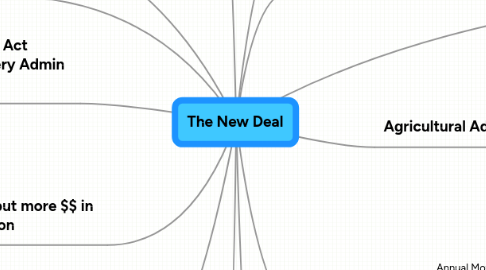
1. Step 1: Banking Holiday
1.1. banks shut down and subject to gov. inspection
1.2. ppls confidence returned and redeposited allowing banks to invest in the economy
2. used to fight the Depression
3. 1st phase
3.1. dealt w/ exclusively economy reform
3.2. FDR believed gov. was crucial to stimulate economy
4. Step 2: Security Exchange Commission
4.1. Stock Market Reform
4.2. practice of buying on margin was regulated
5. Step 3: put more $$ in circulation
5.1. Gold Standard
5.1.1. Could print more $ than Fort Knox gold reserves would allow
5.1.2. w/ more circulation, wages and prices increased
5.2. Keynesian economics
5.2.1. Inflation, causing dollar value to lower- gave gov. spending power.
6. National Industrial recovery Act (NIRA) and National Recovery Admin (NRA)
6.1. established to end animosity but not labor and business
6.2. all was redirected to industrial growth
6.2.1. fair labor codes established
6.2.1.1. wages, no child labor, shortened work hours
6.3. Business people challenged the NRA, claiming it was communist
6.3.1. Liberty League
6.3.1.1. The Supreme Ct. overturned the NIRA & NRA- claimed fed. gov. was exceeding its authority (thru interfering in state jurisdiction)
7. Civilian Conservation Corps
7.1. set to establish work for young men in areas of reforestation, soil conservation, flood control, road conservation
7.2. took them out of urban labor markets but Blacks permitted to enroll
7.3. National Youth Admin. (NYA)
7.3.1. created jobs for young in urban areas
7.4. Fed. Emergency Relief Act. (FERA)
7.4.1. aimed at older workers
7.5. worked well but was still at 6 million
8. Revolution
8.1. changed the way gov. functions
9. Tennessee Valley Authority (TVA)
9.1. used to promote hydroelectric power, control flooding- lower rates
9.1.1. private industry, manufacturing fertilizer
9.1.2. Fed. gov. took ownership
10. Pictures
10.1. Annual Move
10.1.1. Otis Dozier, 1936
10.2. Kansas City from Politics, Farming, and the Law
10.2.1. Thomas Hart Benton, 1936
10.3. Construction of the Dam
10.3.1. William Gropper
11. Agricultural Adjustment Act
11.1. passed in 1933 to aid formers
11.2. objective was to restore farmers' purchasing power; the family farm
11.2.1. had farmers cut back on crop production by paying them equivalent SUBSIDIES (paid not to produce)
11.3. Bad side
11.3.1. food production down when millions were starving
11.3.2. Black sharecroppers were hurt: white landowners paid not to farm so they got rid of Black tenant formers
11.4. 1935
11.4.1. AAA declared unconstitutional by courts so it was revised and introduced as new legislation (too much control over individual states)
11.4.1.1. Food Stamp Act of 1939
11.4.1.1.1. gave away surplus food to poor, also guaranteed (small) farmers market
12. Social Reform Aspect
12.1. National Labor Relations Act
12.1.1. legitimized unions and labor tactics such as collective bargaining & collective action
12.1.2. outlawed Blacklists and other anti-union practices
12.2. Social Security Act
12.2.1. "creeping socialism". typifies the Welfare State: unemployment insurance, old age pensions
12.2.2. Problem: it took some $$ out of circulation at a time when purchasing power was already low & only covered the unemployed= "Soak the Rich" tax
